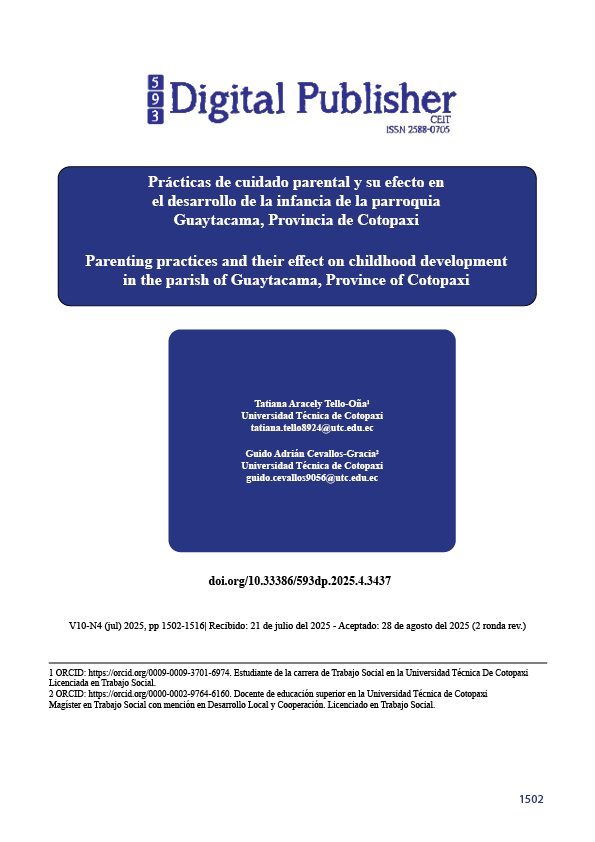Parenting practices and their effect on childhood development in the parish of Guaytacama, Province of Cotopaxi
Main Article Content
Abstract
This article analyzes the parenting practices of mothers and fathers in the parish of Guaytacama, Cotopaxi Province, Ecuador, and how these practices impact the development of children during early childhood. It also analyzes how social, cultural, and economic conditions affect these practices. To this end, a qualitative approach with a descriptive, non-experimental design was adopted, using semi-structured interviews and direct, non-participatory observation to collect information. The sample was selected through intentional qualitative sampling, considering highly significant sociodemographic variables such as age, educational level, and household structure. It consisted of fifteen parents (ten mothers and five fathers), predominantly young mothers under the age of 22 (80%) and fathers who were mostly adults over the age of 45 (80%). The results of the research indicate that much of the responsibility for the household falls on mothers; however, to a lesser extent, the participation of fathers was also noted, with their involvement being mainly oriented toward discipline and order rather than affection. The study also revealed a decline in the birth rate, especially among the young population, which favors infant care. Despite the economic difficulties of the study population, many parents transmit values such as empathy, affection, responsibility, and love to raise their children in the best way possible during this early stage of their growth.
Downloads
Article Details

This work is licensed under a Creative Commons Attribution-NonCommercial-ShareAlike 4.0 International License.
1. Derechos de autor
Las obras que se publican en 593 Digital Publisher CEIT están sujetas a los siguientes términos:
1.1. 593 Digital Publisher CEIT, conserva los derechos patrimoniales (copyright) de las obras publicadas, favorece y permite la reutilización de las mismas bajo la licencia Licencia Creative Commons 4.0 de Reconocimiento-NoComercial-CompartirIgual 4.0, por lo cual se pueden copiar, usar, difundir, transmitir y exponer públicamente, siempre que:
1.1.a. Se cite la autoría y fuente original de su publicación (revista, editorial, URL).
1.1.b. No se usen para fines comerciales u onerosos.
1.1.c. Se mencione la existencia y especificaciones de esta licencia de uso.
References
Aguirre, J., & J., J. (2015). El papel de la descripción en la investigación cualitativa. Cinta moebio, 175-189.
Calle, S. (2023). Diseños de investigación cualitativa y cuantitativa. Ciencia Latina Revista Científica Multidisciplinar, 1865-1879.
Carpio, M., Moreira, B., Quintero de Contreras, A., & Contreras, J. (2025). Prácticas de cuidado materno al infante. European Public & Social Innovation Review, 1-19.
Hermida, P., Barragán, S., & Rodríguez, J. (2017). La Educación Inicial en el Ecuador: Margen Intensivo y Extensivo. Analitika, 7-46.
(INEC)., n. N. (28 de 02 de 2023). Boletín Técnico N° 05-2023-ENEMDU. Obtenido de Ecuador en cifras: https://www.ecuadorencifras.gob.ec/documentos/web-inec/EMPLEO/2022/Anual/Bolet%C3%ADn%20t%C3%A9cnico%20anual%20enero-diciembre%202022.pdf.
Izcara, S. (2014). Manual de Investigación Cualitativa. México D.F: Distribuciones Fontamara.
Moreno, M. (2020). Aprendizaje y desarrollo en la primera infancia. Educación, 63-72.
Pontificia Universidad Católica del Perú. (2022). La Investigación Descriptiva con Enfoque Cualitativo en Educación. Lima: Facultad de Educación PUCP.
Salazar, Y. (2023). Prácticas de crianza y educativas para la equidad de género en primera infancia [Trabajo de grado, Universidad Externado de Colombia]. Bogotá: Repositorio U. Externado.
Salgado, P. (2025). Desigualdad educativa en zonas rurales y urbanas del Ecuador. Perspectivas Sociales y Administrativas, 5-16.
Simbaña, M. (2018). Espacios de participación parental: una aproximación etnográfica a un centro infantil de una comunidad rural indígena y campesina ecuatoriana. Barcelona: Tesis doctoral, Universidad Autónoma de Barcelona.
Tubon, L., Chiluisa, M., Bayas, N., & Condo, S. (2025). Neuroplasticidad en la Primera Infancia y su Impacto en la Enseñanza en Educación Inicial. Revista Veritas de Difuso Cientifica, 1847-1868.
Unicef Ecuador (3 de mayo de 2023). Violencia. El principal desafío para la infancia en Ecuador. Obtenido de Unicef: https://www.unicef.org/ecuador/comunicados-prensa/violencia-el-principal-desaf%C3%ADo-para-la-infancia-en-ecuador
Unicef Ecuador. (26 de octubre de 2023). El matrimonio y las uniones infantiles tempranas y forzadas en niñas y adolescentes persisten en Ecuador. Obtenido de Unicef Ecuador: https://www.unicef.org/ecuador/comunicados-prensa/el-matrimonio-y-las-uniones-infantiles-tempranas-y-forzadas-en-ni%C3%B1as-y
Villarreal, J., & García, M. (2022). La Aplicación de Entrevistas Semiestructuradas en Distintas Modalidades Durante el Contexto de la Pandemia. Revista Científica Hallazgos, 52-60.
Yanacallo, E., Moposita, J., & Salazar, Y. (2017). Cuidado infantil y participación de la mujer en el mercado laboral de Ecuador. Revista Economía y Política, 9-48.



